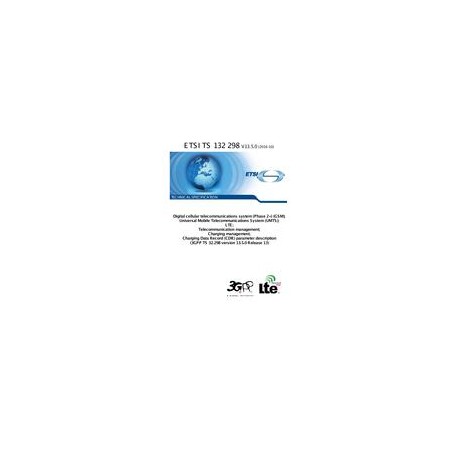Cart 0 Product Products (empty)
No products
To be determined Shipping
$0.00 Total
Product successfully added to your shopping cart
Quantity
Total
There are 0 items in your cart. There is 1 item in your cart.
Total products
Total shipping To be determined
Total
New Reduced price!  View larger
View larger
 View larger
View larger ETSI TS 132 298
M00002967
New product
ETSI TS 132 298 Digital cellular telecommunications system (Phase 2+); Universal Mobile Telecommunications System (UMTS); LTE; Telecommunication management; Charging management; Charging Data Record (CDR) parameter description (3GPP TS 32.298 version 13.5.0 Release 13)
standard by European Telecommunications Standards Institute, 10/01/2016
In stock
More info
Full Description
ETSI TS 132 298 is part of a series of Technical Specifications (TSs) that specify charging functionality andcharging management in 3GPP networks (GSM/UMTS/EPS). The 3GPP core network charging architecture andprinciples are specified in document TS 32.240 [1], which provides an umbrella for other charging managementdocuments that specify: the content of the CDRs per domain and subsystem (offline charging); the content of real-time charging events per domain/subsystem (online charging); the functionality of online and offline charging for those domains and subsystems; the interfaces that are used in the charging framework to transfer the charging information(i.e. CDRs or charging events).The complete document structure for these TSs is defined in TS 32.240 [1].The present document specifies the CDR parameters, the abstract syntax and encoding rules for all the CDR types thatare defined in the charging management TSs described above. Therefore, it is only applicable to offline charging. Themechanisms used to transfer the CDRs from the generating node to the operator's Billing Domain (e.g. the billingsystem or a mediation device) are specified in TS 32.297 [52]. Further details with respect to the operator's BillingDomain for offline charging are out of scope of 3GPP standardisation.
Note that a generic Diameter application for online charging in 3GPP networks is specified in TS 32.299 [50].
Furthermore, 3GPP TSs are being created to standardise some technical aspects of the operator's Billing Domain foronline charging, i.e. the Online Charging System (OCS).
All terms, definitions and abbreviations used in the present document, that are common across 3GPP TSs, are defined inthe 3GPP Vocabulary, TR 21.905 [100]. Those that are common across charging management in 3GPP domains orsubsystems are provided in the umbrella document TS 32.240 [1] and are copied into clause 3 of the present documentfor ease of reading. Finally, those items that are specific to the present document are defined exclusively in the presentdocument.
Furthermore, requirements that govern the charging work are specified in TS 22.115 [101].

